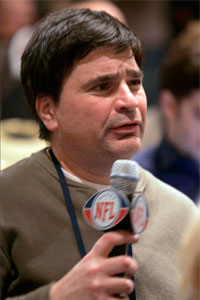Newsletter of the Milwaukee Newspaper Guild
Membership meeting
WHEN: Noon Tuesday,Sept. 13
WHERE: Turner Hall
AGENDA: Elect Executive Board, vote on bylaws amendments and dues.
Lunch will be served.
Time to vote for Guild executive board
That recall stuff is over, at least for now, but we’re not done voting yet.
Milwaukee Newspaper Guild members will elect our next Executive Board at our annual membership meeting at noon Sept. 13 at Turner Hall. Members will also vote on bylaws amendments and on keeping dues at their current low level.
Our local’s second-in-command, 1st Vice President Meg Kissinger, has announced she will not be running for a third term. That means we’ll be seeking someone else for her position, in charge of grievances and contract enforcement.
Kissinger, a metro reporter, has served in her current position since fall 2009 and previously has been a board member, associate steward leader, committee chair and steward. She also leads our 6.6% Committee, which has been mobilizing in support of restoring our wages to where they were before the pay cut.
In addition to the 1st vice president, members will elect a president (our chief executive officer and public spokesperson), 2nd vice president (in charge of membership and mobilizing, as well as communications and social events), secretary (managing our office and taking minutes), treasurer (our chief financial officer) and three at-large board members (all expected to be active in other Guild roles). All will serve one-year terms, starting Oct. 1.
Once in office, the new board’s first job will be to fill appointed posts. That includes up to three steward leaders (each overseeing grievances, membership and stewards for part of our unit); chairs and members of the Communications, Social, Health & Safety, Human Rights and Good & Welfare committees; newsletter editor; webmaster; technology coordinator (in charge of our office equipment); and Grievance & Representation Committee members to enforce wage provisions, deal with benefit matters and handle posting and jurisdiction issues. Steward leaders and vice presidents will then name stewards.
Also on the agenda are three bylaws amendments recommended by the board. One would formalize the Good & Welfare Committee, established this year, as a standing committee. Another would give the board the annual option to appoint a coordinator instead of a committee for Human Rights, an option that already exists for Health & Safety. The third would transfer day-to-day responsibility for organizing new bargaining units from a standing committee to the president, with the option to appoint a committee to help if an organizing opportunity arises.
We’ll also take our annual vote on whether to keep our dues rate at 1%, a discount from the normal rate set by the international.
Unlike past years, members won’t be voting for delegates and alternates to the Guild’s international sector conference and the international convention of our parent union, the Communications Workers of America. Both have shifted from an annual to a biennial schedule, so they won’t meet again until 2013.
The meeting is open only to dues-paying members. Lunch will be served.
New website, phone number
We’ve moved…sort of.
While our e-dress is still milwaukeenewsguild.org, we’ve made a few changes to the site. First, we started using WordPress as our new publishing system. Simply put, WordPress will make the site much easier to manage and update.
Using WordPress also allows for the next change on the list: Our blog, formerly hosted on Blogger, is now part of our website. You can see the latest updates at milwaukeenewsguild.org/blog.
As part of all these changes, we’ve also redesigned the site. The information found there is all the same — steward lists, a copy of the contract, etc — it’s just been rearranged a little.
In a non-website move, we also changed our phone number. As part of our move to Google Voice – a free, virtual voice mailbox of sorts – our number is now 414-301-2696.
Wages, job security, benefits on the table
These are the questions to be settled in bargaining between the Milwaukee Newspaper Guild and Journal Sentinel Inc.: Is a temporary wage cut supposed to be permanent? Should we be secure in our job security? And should we have some assurance of how much we pay for health insurance?
The Guild believes the 6.6% wage cut we approved in 2009 was indeed supposed to be temporary. We have told management we expect everyone’s pay to be restored to the level it was at before the cut.
By contrast, the company’s wage package would effectively make pay cuts permanent for many employees by reducing minimum wage scales and basing all raises on merit, with no promise of ever returning to our former pay levels.
Our proposed contract also would improve job security, increase paid time off and provide more benefits for part-timers. Management proposed a contract that would eliminate crucial guarantees for job security and health care.
Bargaining on the next Guild contract started June 21 and continued at sessions June 22 and July 20. Here’s a look at some of the major issues:
Job security: The Guild proposal would reinstate language that was in every contract but the most recent one, requiring downsizing to start with the least senior employees, with a number of exceptions. The company proposal would keep the current language, in which seniority is the tie-breaker in deciding who gets cut if all other factors are equal.
At the same time, the company is also seeking to delete provisions that require two weeks of severance pay for each year of service; 60 days’ notice of downsizing or 60 days’ pay, even when not required by law; and buyouts before downsizing, with the number of employees who take the buyout reducing the number who would be involuntarily cut. Under the management proposal, all of those matters would be under the company’s control unless we could negotiate something else in the days before the job cuts. The Guild proposal would keep all current job security guarantees.
Wages: The company proposal would cut all wage scales by 4.4% (cementing the 6.6% cut of 2009, minus the 2.2% increase from post-cut levels this year), delete all language about across-the-board raises and wage restoration, and base all raises on merit. Although the Guild has not yet presented a formal wage proposal, our negotiators said wages should be restored for all members of our team.
On other compensation issues, the Guild proposed increasing mileage reimbursement to the rate set by the Internal Revenue Service (51 cents a mile, up from our current 35 cents and our contractual floor of 29 cents), while the company proposed eliminating pay for republication of photos or artwork and for books consisting of reprinted material.
Health care: The Guild proposal would reduce the maximum employee share of health care premiums from 35% to 25% of total cost, and would require the company to negotiate with us on changes in health plans. The company proposal would eliminate the guarantee on premium levels and keep the language that gives management control over plan design.
Time off: The Guild proposal would add Martin Luther King Day as a paid holiday, starting in 2013; provide a month of paid parenting leave and a week of paid family medical leave; and increase total family medical leave, including unpaid time off, from the two weeks provided by state law to the 12 weeks provided by federal law. The company’s proposal offers no improvements in paid time off beyond the floating holidays and other changes adopted this year.
Part-timers: The Guild proposal would offer health care and paid sick days to part-timers who work at least 1,000 hours a year (about 20 hours a week); provide paid holidays, on a pro-rated basis, to all part-timers; and reinstate the fifth week of vacation, after 20 years of service, for part-timers hired after 2006, the only members of our bargaining unit who didn’t get that week back in the deal signed this year.
We also indicated our intention to seek fair pay for part-timers, who are now on a lower pay scale for their first two or three years. The company proposal would eliminate the provision that raises part-timers’ pay from 80% to 90% of the full-time hourly minimum after one year of service.
During the first three sessions, we tentatively agreed on a number of contract provisions that will either stay the same or undergo only minor or technical changes. We also discussed language dealing with training, diversity, pensions, 401(k)s, ergonomics and the cafeteria (where management said no changes are planned).
The normal order of bargaining is to work through the easiest issues first and tackle the toughest matters — typically including wages — last. But in a change from our previous procedure, management indicated it was reluctant to proceed without a full wage proposal from our side. For that reason, we took a break from bargaining in August to work on our wage offer, and we expect talks to resume in September.
Our Bargaining Committee is also undergoing a few changes:
- Committee member Doris Hajewski is leaving in the buyout. Hajewski, a business reporter, is also a steward and was a member of our first Executive Board. We’re considering how to replace her.
- International Representative Darren Carroll, who has worked with our local on bargaining, downsizing and other issues for about eight years, has been reassigned to focus on the Guild’s western locals. Carroll, who is based in Minnesota, will be replaced by International Representative Jay Schmitz, who is based in Indiana.
- Our board has named 2nd Vice President Karen Samelson an alternate member of the committee.
- The Guild team continues to be led by metro reporter Larry Sandler and includes our president, sportswriter Tom Silverstein, and business reporter Don Walker. Outside attorney Jonathan Levine leads the management team, which includes Cindy Wargula, the company’s employment and labor relations manager, and Marilyn Krause, assistant managing editor/administration.
News in brief
TAKE US OUT TO THE BALLGAME

A newsroom outing to Miller Park last month got a boost from Local 51.
The Guild this year paid for the main course — hot dogs, hamburgers and brats — as well as a few other tailgate essentials.
Forty-five folks from the newsroom attended. Tents provided by Enrique Rodriguez kept us from sweltering during the pregame festivities.
And the Brewers cooperated, too, beating Houston, 5-4.
BOARD MEMBERS SWAP JOBS
Milwaukee Newspaper Guild members approved a job trade between two Executive Board members May 17.
Metro reporter Amy Hetzner stepped down after about five years as treasurer. Deputy business editor Bob Helbig, who served a record seven years in two prior stints as treasurer, was elected to complete the four months remaining in her term.
Hetzner was elected to Helbig’s at-large board seat. She later took the buyout.
FOURTH FLOOR DECK OPEN AGAIN
With a nudge from the Guild, Journal Sentinel Inc. this summer restored and refurnished the outdoor deck on the fourth floor near the cafeteria.
The deck is made of a composite of wood and plastic, which means it should last for many years.
Restoring the deck is an issue that had been raised with management by Guild 1st Vice President Meg Kissinger.
In May, we approached Editor Marty Kaiser about what it would take to open the deck. We even offered to discuss kicking in some of the cost. Kaiser immediately got on speakerphone with Journal Sentinel Executive Vice President Royce Miles, who said he would talk with CEO Steve Smith and Chief Financial Officer Andre Fernandez about it. Within days, Miles responded with an email: “Our corporate leadership has heard your concerns loud and clear and appreciate your willingness to work together as a team. Effective immediately, we have received approval to move forward with the complete overhaul of the deck and the purchase of deck furniture. It should be available for use within 10 weeks.”
In late June, the company finished the deck, well ahead of schedule. New furniture was in place a few weeks later.
We’re bargaining for what’s fair

From the president
As we move from the vacation season into autumn — it’s hard to admit summer will be over soon — we will be that much closer to the expiration of our current collective bargaining agreement with Journal Sentinel Inc. Here are a few things that I try never to forget every time we sit across the table from the company’s outside negotiator:
- Since the pay cuts of 2009, those Local 51 members who are still at the company have given back more than $1 million to our employer.
- The amount of work we’re taking on has increased as our pay has gone down.
- Top executives, including CEO Steve Smith, were handed bonuses far and away more lucrative than the one-time 2% bonus we got in 2010.
- Smith’s compensation rose 39.7% from 2009 to 2010 while our pay went up just over 2% this spring.
- The company posted a profit of $34.4 million in 2010.
It’s not hard to keep such things filed in a prominent place, especially when
you’re aware of the level of talent and dedication we have in the newsroom. What comes to mind over and over again is, whatever happened to fairness?
When did we become one of those companies we’re always writing about whose executives get paid first and whose employees get the cold shoulder?
The company’s initial offer to us started about as low as one could imagine. Under their proposal, our current wages would become the standard and any raises above that would be completely at the whim of the company.
In addition, they would like to eliminate our severance package of two weeks for every year of employment at the Journal Sentinel.
This is not the kind of gesture that warms one’s heart.
In the coming months, I’d like you to think hard about what the wage cuts have meant to you and whether rewarding the top brass with enormous raises seems unfair. I want you to think about how much of your life you and so many others around you have poured into this job with the betterment of the newspaper the sole priority.
There is strength in numbers, which is why we have a union in the first place, and we don’t have to settle for being the ones bearing the brunt of the company’s slip in revenue. When you can afford to pay one, you can afford to pay all.
My call to you is to be active and engaged in the fight for fairness. We’re not asking for anything unreasonable — we’re definitely not asking for a 39.7% increase — we just want management to recognize the sacrifice we made in a time of need.
Please be sure to attend the next membership meeting so we can choose officers and board members who represent your interests. And don’t forget: We just want what’s fair.
